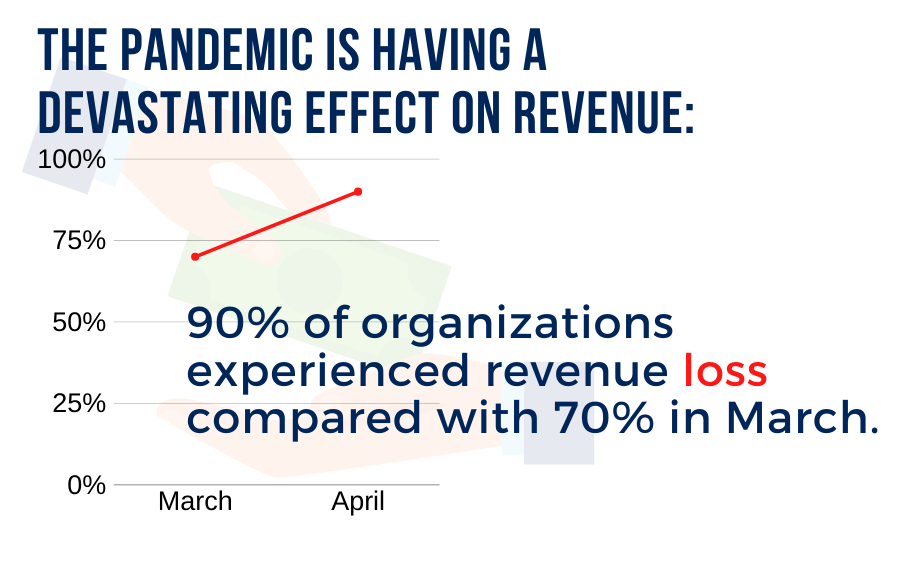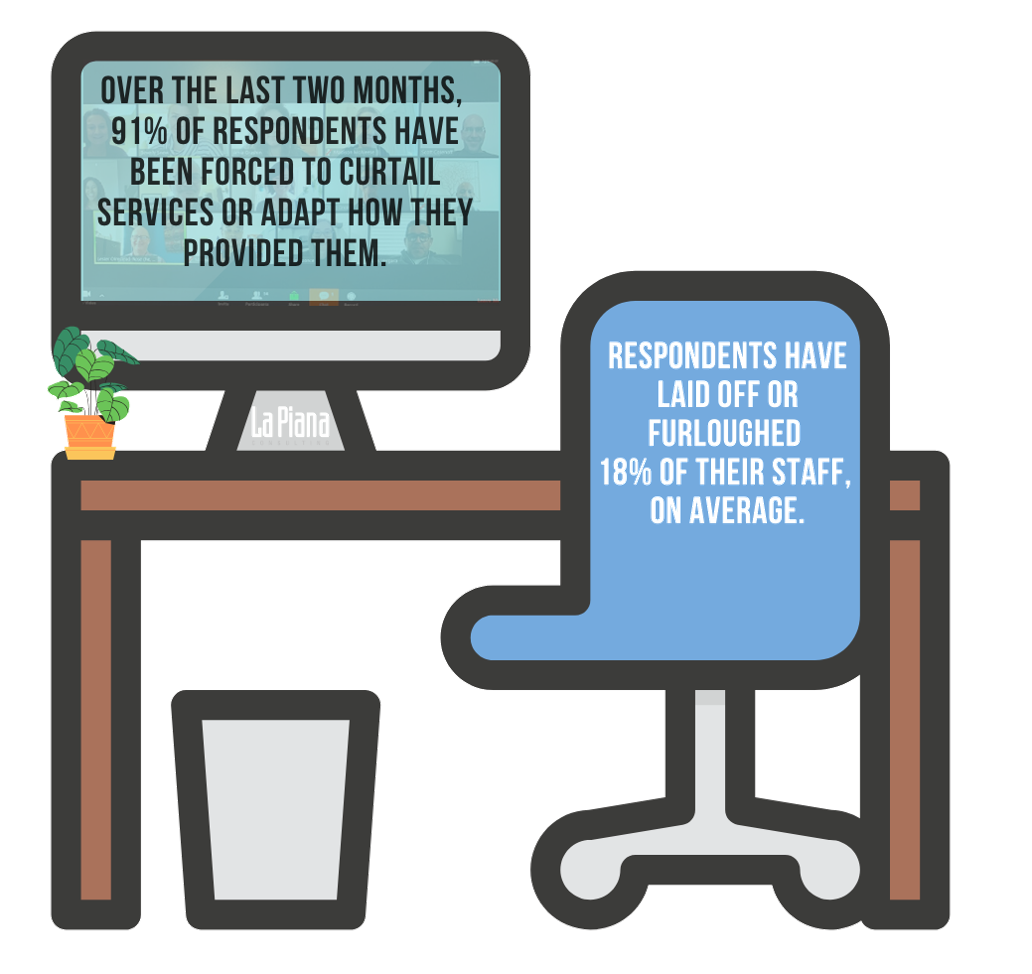The unprecedented COVID-19 crisis has completely transformed life as we once knew it. Governments are scrambling, individuals are filing for unemployment, and small businesses are struggling to keep their doors open. And the social sector, responsible for supporting and engaging communities across the nation, are desperately holding on while funding dries up and doors are closing.
As the national COVID-19 shutdown began to unfold in the middle of March, La Piana Consulting decided to reach out to our colleagues to look for stories and trends that might illuminate the experience of nonprofit organizations across the sector and offer some indication of what lies ahead. We conducted two surveys in March and April receiving over 750 responses, highlighting the interest and desire of nonprofit organizations to understand the crisis from their industry’s perspective.
The results of the March survey were sobering if not surprising. The results of the April survey confirmed that the damage we reported a month earlier was enduring, and the future at best uncertain. For example, in March, 70 percent of respondents reported decreases in revenue, with some as high as 100 percent. The hardest hit groups included arts presenters, museums, and school-based service providers, all of which were prevented from operating by the crisis.
The losses reported were bad enough, but four weeks later, in our April survey, matters had gotten even worse, with 90 percent of respondents reporting revenue losses, often substantial, and nearly half of respondents having to make further reductions in staff. Additionally, 91 percent of respondents have had to curtail their services or adapt how services are provided.
This downward trajectory is especially troubling. The revenue losses and changes in service delivery are a blow to the sector which provides much needed support to communities and at-risk individuals around the country.
Stories from the Field
For people who have dedicated their professional lives to helping others, nonprofit leaders are challenged by the inability to serve their clients as usual. Organizations are now refocusing their strategy to respond to the pandemic and the difficulties it presents. And for organizations working in policy or advocacy, there is an added challenge of fighting the xenophobia and discrimination that occurs during a crisis like this.
The NAACP and ACLU have spoken out in regard to Asian American discrimination as a result of COVID-19, while Amnesty International and Human Rights Watch are working to protect human rights around the world as governments respond to the pandemic.
Other important cultural organizations and museums, such as the Japanese American National Museum and the National WWII Museum, have been forced to temporarily curtail their services at a time when cultural and historical memory are important vehicles for engagement and understanding.
Groups like Public Advocates, a nonprofit law firm and advocacy organization that challenges the systemic causes of poverty and racial discrimination, have had to pivot their current work on housing, transportation, and education to offer resources on tenants’ rights, evictions, and student loans.
These organizations are doing incredibly important work in their communities, while the threat of COVID-19 challenges their ability to do their usual day-to-day work. And while that work may look different now than it did in previous years, nonprofits are finding ways to increase impact to serve their clients and communities.
How to Respond
Nonprofit organizations need funding to survive. In fact, 69 percent of our survey respondents applied for a Cares Act paycheck protection loan, and yet fewer than half of those have actually received funding. But while the U.S. government response to COVID-19 has been less than desirable, foundations and philanthropists have stepped up their giving. Now is the time for funders to consider the immediate needs of the organizations they support by increasing funding. As tempting as it sounds, now is not the time to tighten purse strings, but to double-down on mission.
In addition to funding challenges, now is the time for nonprofits to adapt, pivot, and prioritize. Responses from our surveys showed that some nonprofit leaders are using the crisis to innovate within their organizations, identifying ways to prioritize programs and increase value and mission impact.
“[The Covid-19 crisis has] inspired us to be more agile, to pivot and approach issues more innovatively... and challenged us to look at our work differently going forward with many staff working remotely and utilizing technology.”
“Two key strategies to respond to COVID-19: We are looking at ways to increase value and benefits to our members and eliminating legacy programs that do not provide maximum value.”
What’s Next?
The future is extremely unsettling and uncertain for all of us across the sector, the nation, and the world. COVID-19 has shattered expectations of what 2021 and beyond will look like, and yet social sector organizations are tackling the challenge head-on by working on the front lines of the crisis, pivoting services, and adapting as best they can to the challenges ahead.
They are building on relationships fostered over the years to confront an unknowable nexus of funding constraints, changing demands, and future legislation amid an unfolding and unprecedented global pandemic that will impact the sector and the world for years to come.
While the future is uncertain, we can be certain that nonprofit organizations will continue to lead the way in engaging communities, supporting individuals, and lifting up silenced voices to create the lasting, systemic change the world desperately needs.
____________________
David La Piana is the founder and managing partner of La Piana Consulting, where he helps social sector executives develop powerful strategies while becoming better leaders for their staffs, boards, and communities.
Madison McAleese is an associate consultant at La Piana Consulting and former communications associate at the Pacific Council for International Policy.
The views and opinions expressed here are those of the authors and do not necessarily reflect the official policy or position of the Pacific Council.






